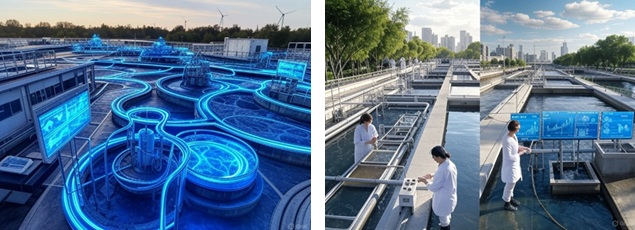AI-enhanced wastewater treatment process automation
Enabling wastewater treatment process automation by AI-enhanced real-time sensing and online control
The availability of clean water is essential for our society. Unfortunately, this is under increasing stress, especially in urban environments. Part of the urban water system is related to the treatment of mostly domestic wastewater. The primary need for wastewater treatment facilities is to limit pollutant discharges in the form of primary nutrients (TN, TP), organic carbon substrates (TOC/COD), and metals in accordance with the urban waste water treatment directive. The wastewater treatment plant will have an increased energy demand in the coming years due to stricter regulations of effluent quality, the “quaternary treatment” for the removal of micropollutants. This additional process step is estimated to result in 20 to 40% more electricity in the coming 15 years. Also, due to climate change, the influent of a wastewater treatment plant changes more rapidly. This will lead to an overall increased energy use and decreased performance, increasing the need for enhanced control of wastewater treatment plants.
Research challenges
The design of a treatment plant is predominantly influenced by the target pollution removal rate, with the efficiency largely depending on the hydrodynamics of the activated sludge reactors incorporated in the treatment plant. The largest challenge in achieving optimal performance is sudden changes in the inflow water quality and quantity, but there also lies a challenge in the variability of the energy supply. Already, in the Netherlands, wastewater treatment plants sometimes cannot operate at full capacity. Enabling increasingly sophisticated treatment processes in a cost-effective and energy-efficient way requires rapid, accurate real-time quantification of wastewater constituents and novel advanced control strategies. Currently, there is a lack of hardware, a lack of evidence of real-world applications, and the required skillset of engineers to develop and maintain sensor-driven solutions.
Your assignment
The overall goal of this project is to identify what is required to make wastewater treatment plants more resilient to changes in water quality and quantity. To achieve this, you will study the application of affordable optical monitoring solutions (UV/VIS) and innovative gas sensing, generic water quality sensors (pH, DO, etc), use weather data, and study the optimal location for monitoring (influent, aerobic treatment, effluent, etc.). You will apply conventional models and add (or even replace with) data-driven models to estimate all relevant parameters for optimal wastewater treatment. This can all be applied and tested at a water treatment facility of (one of) our partners, with the ambition to fully automate this treatment facility.
Your profile
You have a master’s degree in chemical engineering, (bio)process engineering, environmental engineering, or equivalent. You have a passion for modelling and want to understand systems. You are an independent, critical-thinking, motivated student with an affinity for multidisciplinary research. You like working in a dynamic environment and enjoy tackling challenges as they arise.
Keywords: Wastewater treatment; Real-time monitoring; AI-enhanced automation; Energy efficiency; Data-Driven models
Supervisory team:
prof. dr. ir. K.J. Keesman (Wageningen University, Mathematical and Statistical Methods – Biometris); Wetsus supervisors: dr. ir. R.M. Wagterveld (Theme coordinator Monitoring & Quality), dr. ir. C. Schott (Scientific Project Manager)
Project partners: Monitoring & Quality
Only applications that are complete, in English, and submitted via the application webpage before the deadline will be considered eligible.
Guidelines for applicants: https://phdpositionswetsus.eu/guide-for-applicants/
